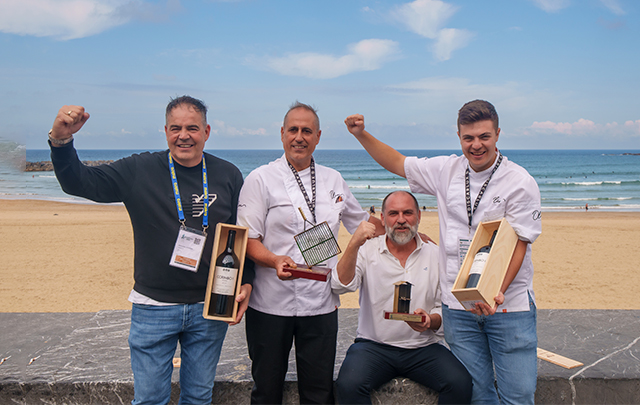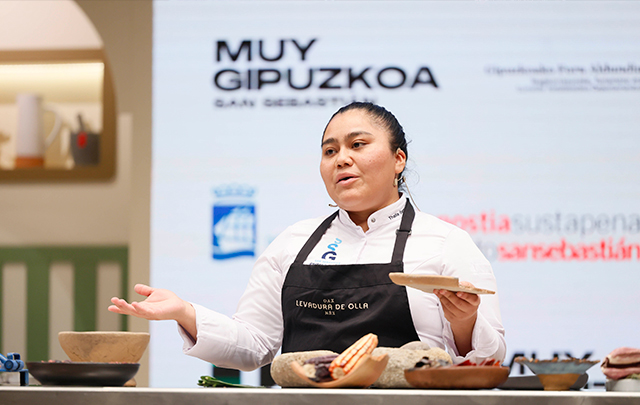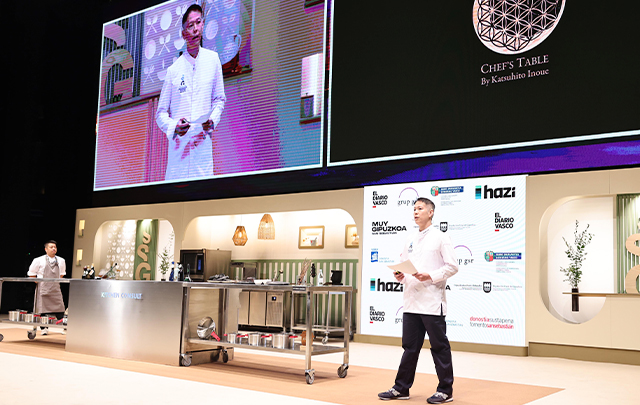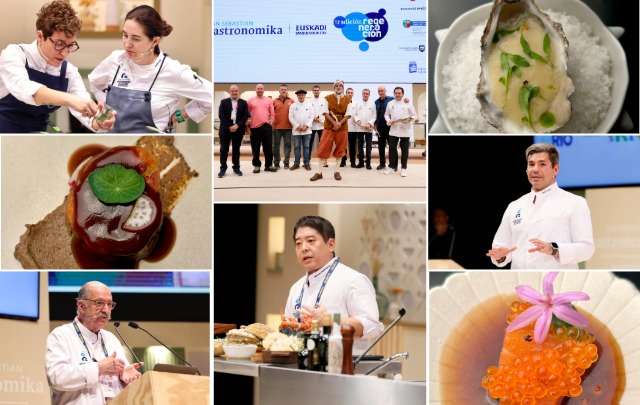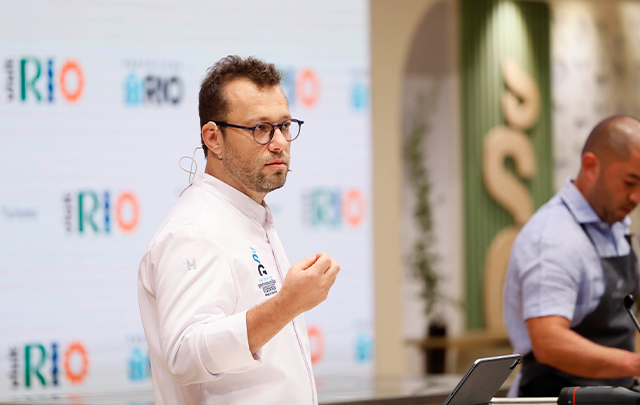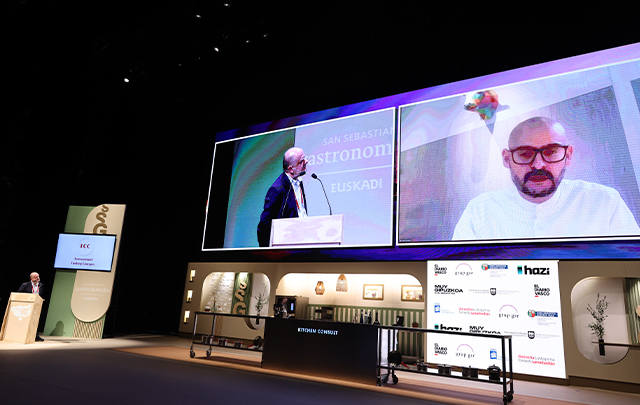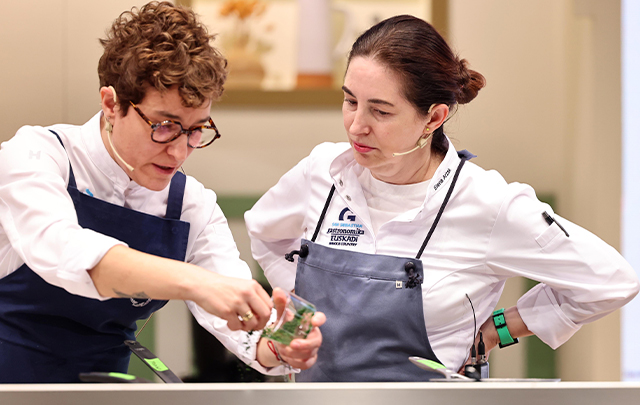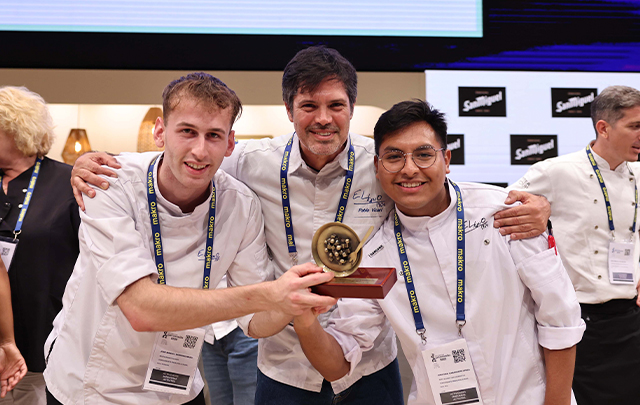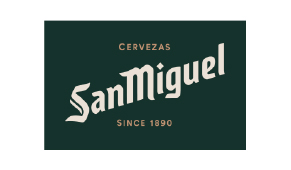News
Tradition and regeneration', from 6 to 8 October, at the 27th edition of Gastronomika
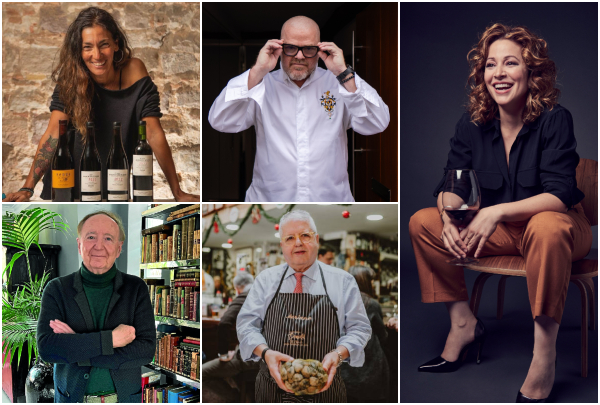
The conference will also address the world of the sea to talk about the exchanges and loans between Cantabrian cultures, about algae, about superbluefood or about the increasingly important role of producers.
The next edition of San Sebastian Gastronomika - Euskadi Basque Country is already underway and will be held from 6 to 8 October at the Kursaal Conference Centre under the title 'Tradition and Regeneration'. It will be the 27th edition of the oldest gastronomy congress, and the four awards of the event will also be presented: the Tribute Award will go to the British chef Heston Blumenthal; the Golden Gueridón will be shared by the Master of Wine Almudena Alberca and the oenologist Sara Pérez; the Pau Albornà i Torras Award for Gastronomic Journalism will go to the gastronomic critic José Carlos Capel, and the Tabernero Mayor will go to Mariano García, from the Donald restaurant in Seville. Gastronomika will also host the second edition of the Congress of Taverns and Restaurateurs, the World Championship of Tripe Cooking and the National Championships of Russian Salad, T-Bone Steak and Fish Soup.
San Sebastian Gastronomika - Euskadi Basque Country will continue to have an area dedicated to the trade fair. Companies interested in presenting their products and innovations at the conference can send their requests and queries to info@sansebastiangastronomika.com. Anyone wishing to attend the conference can register at www.sansebastiangastronomika.com.
San Sebastian Gastronomika - Euskadi Basque Country 2025 will be dedicated to the two most powerful trends in gastronomy at the moment: the revision or return to tradition and the commitment to regeneration in order to overcome the concept of sustainability, which has become hackneyed and inadequate and has lost strength because it has been exploited without sufficient real change. It is time to move to a bolder vision that does not just sustain the current system but radically transforms it. Sustainability has often been adopted as a marketing slogan without any real commitment to structural change. This has led to the term being used without any real backing in concrete action. Sustainability has always been about meeting the needs of the present without compromising the ability of future generations to meet their own needs. But in a world where climate, economic and social crises have intensified, maintaining the status quo is no longer enough. Hence the talk of more advanced concepts such as regeneration, which seeks not only to avoid damage to ecosystems but also to repair them, and a commitment to true circularity that goes far beyond simple recycling. For this reason, San Sebastian Gastronomika - Euskadi Basque Country will be focusing on regeneration as the most advanced approach at the moment, a trend that also speaks of not keeping things as they are, so that they do not get worse, but of restoring them to their previous state, before human action brought them to a critical situation.
The director of San Sebastian Gastronomika - Euskadi Basque Country, Benjamín Lana, explains that 'when we talk about regeneration, we are proposing a model of active improvement of these damaged ecosystems, communities and also gastronomic cultures. We are moving from how we can avoid causing damage to how we can make a positive contribution. The idea is to see how we can all bet on a model of positive impact.
In the latest Basque cuisine, which has been the dominant style in recent years, the current generation of chefs has built its philosophy and discourse around the product and tradition. In contrast to the more avant-garde approach of their revolutionary predecessors, most of the establishments that are currently taking up the baton are moving away from the traditional concept of haute cuisine, revisiting everything from the world of the grill to the cuisine of the farmhouse. On the concept of tradition, Benjamín Lana clarifies that 'a regenerative restaurant not only buys local products, but also actively supports farmers, helps them restore degraded soils, works with local communities to strengthen culinary traditions, revalues forgotten ingredients, how we reinterpret or think about this concept of tradition. I like to think of it as innovation without disruption. We have a serious problem with the scarcity and disappearance of authentic products. We need to work on reversing this and giving the whole concept of tradition a deeper meaning beyond the cultural".
Another important theme in this edition of Sebastian Gastronomika - Euskadi Basque Country is the sea. In recent years, the overexploitation of species has led chefs and suppliers to look for more sustainable alternatives and to increase the use of short-life fish. There has also been an increase in collaboration between chefs and artisanal fishermen to source responsibly caught products, as well as consumer interest in trying new flavours and knowing the origin of seafood. The director of the congress says: "We're going to talk about the history and the story of the sea, we're going to talk about exchanges and loans between Cantabrian cultures, we're going to talk about seaweed, we're going to talk about super blue foods and also about sustainable aquaculture. There will be room for all the restaurants, all the chefs and all the producers. We are going to put a lot of focus on the world of producers.
Tribute Award
British chef Heston Blumenthal will receive the San Sebastián Gastronomika Euskadi Basque Country 2025 Tribute Award. Heston Blumenthal is one of the most important and revolutionary chefs in the history of contemporary cuisine, and he now runs a gastronomic empire with more than 700 employees. He is the chef who challenged Ferran Adrià for world leadership in the early years of the 21st century.He is the chef who challenged Ferran Adrià for world supremacy in the early years of the 21st century, and who was voted number one in the world by The 50 Best Restaurants in 2005 after taking his restaurant, The Fat Duck, to the pinnacle of world gastronomy.
Blumenthal has achieved great things in the kitchen, but his greatest achievement has less to do with a particular technique or dish than with his understanding of the culinary experience as a set of perceptions linked to memory. He has made us understand that cooking is much more than a dish: it is a sound that guides our emotions, a scent that penetrates our memories, a moment of happy nostalgia before a taste that jumps from a recognisable moment in the past to a future of cooking that we can barely imagine.
Heston Blumenthal opened a small bistro in the town of Bray in 1996 without any training in cooking. His culinary training had been limited to the many French restaurants he had visited with the money he earned selling photocopiers, a three-week apprenticeship in a couple of English restaurants and reading lots of French cookbooks in his mother's kitchen, which he translated with difficulty using a dictionary. His restaurant, in an old pub, grew with him. In 2000, in the midst of the difficulties encountered by his boundless modernity in premises designed for something else, he received his first Michelin star. This prompted him to change everything. He renovated the place from top to bottom. He called in scientists from Bristol University to help him solve problems that no other chef had faced before. Blumenthal was to become world famous as a pioneer of liquid nitrogen. Six years after his first star, he already had the three that are bestowed on a chef. He would go on to share the top spot in the international rankings with Ferran Adrià.
Queen Elizabeth II awarded him the Order of the British Empire for his services to British gastronomy. The British Heraldic Office granted him the right to bear his own coat of arms: he chose a duck with three sprigs of lavender in its mouth. He is also the only chef to have been made an honorary member of the Royal Society of Chemistry, Britain's professional body for chemists.
Golden Gueridón
The Gueridón de Oro de Gastronomía, which recognises a brilliant career in the world of wine, will be shared on this occasion by two of the most important women in the sector, oenologists Almudena Alberca and Sara Pérez. In August 2018, Almudena Alberca MW became the first female Master of Wine in Spain, the only female representative among the four MWs in the country. Master of Wine is the title that represents the highest level of knowledge and excellence in the wine sector, with just over 400 holders worldwide. With a career spanning more than 20 years in the wine sector, the oenologist, who was born in Zamora, has developed her career in Spain and combined it with international experience in places as far afield as New Zealand. She has worked in boutique wineries such as Viñas del Cenit (Tierra del Vino de Zamora D.O.) and Dominio de Atauta (Ribera del Duero D.O.). She has also worked in the family wineries of the Entrecanales Group (Domeqc), where she has produced wines that have received great acclaim from specialist critics.
Sara Pérez is the daughter of a generation that has redefined winemaking in Priorat. An advocate of organic farming and the role of women in the world of wine, Pérez is the oenologist behind the Mas Martinet and Venus La Universal wineries. For her, making wine is a cultural and personal act that requires listening to the land and a willingness to take risks. An outstanding winemaker, she is recognised for her commitment to organic and sustainable viticulture. The daughter of Josep Lluís Pérez, a pioneer in the revitalisation of the Priorat, she took over the management of Mas Martinet in 2000 and has been committed to the recovery of indigenous varieties and environmentally friendly techniques. Together with René Barbier, he founded Venus La Universal in the Montsant D.O., where they have produced wines such as Venus and Dido. With a background in biology and philosophy, his innovative and artisanal approach has won him numerous awards and consolidated his position as a key figure in the contemporary winemaking scene.
Pau Albornà i Torras Gastronomic Journalism Prize
The gastronomic critic José Carlos Capel will receive the Pau Albornà i Torras Gastronomic Journalism Prize. José Carlos Capel is one of the most respected and knowledgeable figures in Spanish cuisine, a member of the Royal Academy of Gastronomy and several Spanish and European gastronomic guilds. In 2003 Capel founded the Madrid Fusión Gastronomic Summit, of which he is still president, and he has published 45 books of gastronomic literature. He has one of the most important collections of gastronomic books in the world, with more than 5,000 different copies.
He has been a food critic for El País newspaper for more than 35 years, publishing his impressions of the restaurants he visits all over the world. Every day of the year he eats out at least once, sometimes twice, in search of unknown young chefs or to visit the establishments of established chefs.
Restaurateur of the Year
Of the 50 years that the Donald restaurant (Seville) is celebrating, Mariano García has been there for 48. He started as a waiter just before his 18th birthday, after parking his motorbike outside the door and asking for a job. Manuel Ávila (his boss and owner of the restaurant) told him that if he had a white shirt he would be hired. It took him 20 minutes to start working there. In 1987, when his boss retired, he decided to take over the business with two other colleagues, although for some years now he has been running this well-known establishment on Calle Canalejas in Seville on his own. Over the decades, Mariano has made sure that nothing has changed at Donald's, always offering the same recipes and prioritising attentive service that respects the traditional Sevillian way of life. The tavern has seen him fight on all fronts: as a boy running errands, as a kitchen assistant, as a waiter and as a manager.



